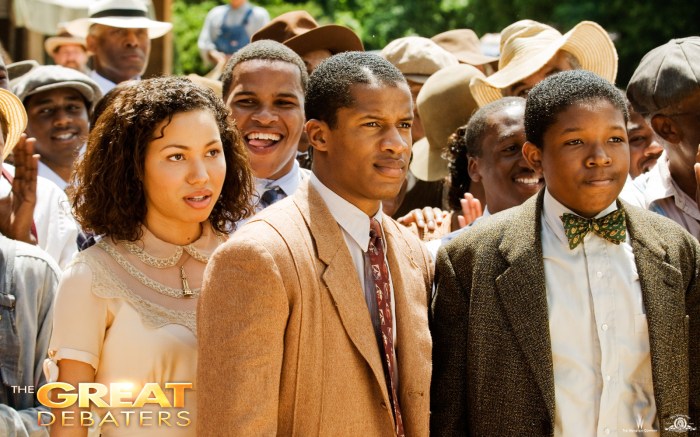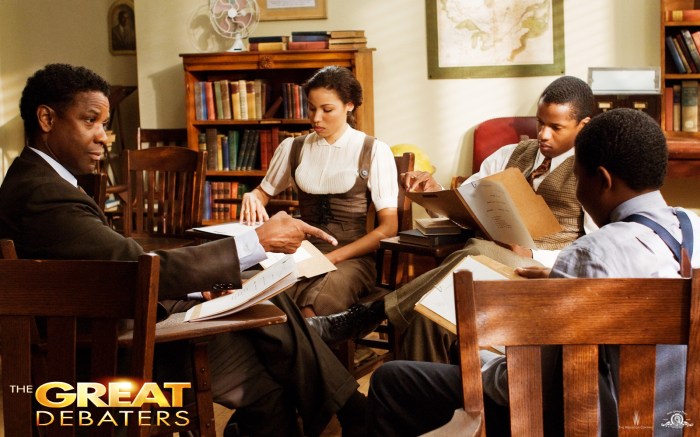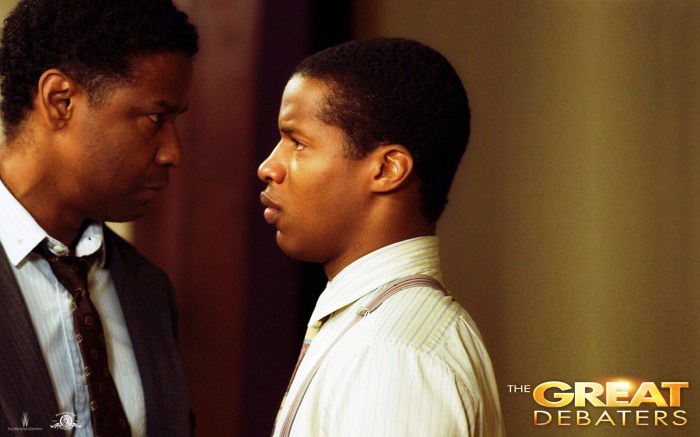Welcome to the great debaters answer key, where we delve into the captivating world of rhetoric, social change, and the enduring legacy of the Great Debaters. This key will unlock a treasure trove of insights into the historical context, rhetorical strategies, character development, and impact of this iconic film.
The Great Debaters tells the inspiring story of a debate team from Wiley College that challenged the norms of the segregated South in the 1930s. Through their powerful words and unwavering determination, these young debaters not only shattered stereotypes but also played a pivotal role in the burgeoning Civil Rights Movement.
The Great Debaters Historical Context

The Great Debaters era was a time of great social and political upheaval in the United States. The Civil Rights Movement was gaining momentum, and the nation was grappling with the issue of racial segregation.
In this context, the debate team at Wiley College, a small, historically black college in Texas, emerged as a powerful force for change. The team, led by coach Melvin B. Tolson, was known for its fiery speeches and its ability to challenge the prevailing racial stereotypes.
Significance of the Debate Team
The Wiley College debate team had a profound impact on the Civil Rights Movement. The team’s victories over white opponents helped to break down racial barriers and to demonstrate the intellectual capabilities of African Americans.
The team’s success also inspired other black colleges and universities to establish their own debate teams. These teams became important training grounds for future civil rights leaders.
Rhetorical Analysis of the Great Debaters

The Great Debaters showcased the power of rhetoric, with debaters employing various strategies to persuade their audiences. They skillfully wielded pathos, logos, and ethos to craft compelling arguments that resonated with the emotions, intellect, and values of their listeners.
Use of Pathos
Pathos, the appeal to emotions, was a central component of the debaters’ arsenal. They evoked strong feelings by using vivid imagery, personal anecdotes, and emotional appeals. For instance, Henry Lowe’s speech about the horrors of slavery stirred the audience’s empathy and indignation, while Samantha Booke’s passionate delivery of her closing argument appealed to their sense of justice.
Use of Logos, The great debaters answer key
Logos, the appeal to logic and reason, played a significant role in the debaters’ arguments. They presented well-structured arguments, supported by evidence and sound reasoning. Melvin Tolson, in particular, demonstrated his mastery of logical reasoning, using historical examples and statistical data to support his claims.
Use of Ethos
Ethos, the appeal to credibility and character, was also crucial to the debaters’ success. They established themselves as knowledgeable and trustworthy authorities on the topics they debated. Their personal experiences, reputations, and connections with the audience lent weight to their arguments.
James Farmer Jr.’s reputation as a civil rights activist, for example, gave his words added credibility.
Character Development and Motivations
The Great Debaters features a cast of complex and well-developed characters, each with their own motivations and perspectives on race and equality.
Melvin B. Tolson
Tolson, the coach of the Wiley College debate team, is a passionate and dedicated educator who believes in the power of education to transform lives. He is a gifted orator and a brilliant strategist, and he uses his skills to help his students develop their own voices and to challenge the prevailing racial stereotypes.
James Farmer Jr.
Farmer is a young debater who is initially reluctant to join the team, but he eventually comes to embrace Tolson’s vision. He is a gifted speaker and a quick thinker, and he uses his talents to argue for racial equality and justice.
Henry Lowe
Lowe is a star debater who is initially arrogant and self-centered. However, as he spends more time with Tolson and the other debaters, he begins to develop a sense of empathy and compassion. He comes to realize that his own success is not enough, and he begins to use his voice to speak out against racism.
Samantha Booke
Booke is the only female debater on the team. She is a bright and articulate speaker, and she is not afraid to challenge the status quo. She is a strong advocate for women’s rights and equality, and she uses her voice to speak out against sexism and racism.These
are just a few of the many complex and well-developed characters in The Great Debaters. Each character has their own unique motivations and perspectives, and their interactions with each other help to create a rich and nuanced exploration of race and equality.
The Role of Education and Debate in Social Change: The Great Debaters Answer Key

Education and debate are powerful tools for promoting social change. They provide individuals with the knowledge, critical thinking skills, and communication abilities necessary to challenge injustice and advocate for positive change. The Great Debaters, a group of African American college students from Wiley College in Texas, used debate as a tool for activism, challenging racial segregation and discrimination in the early 20th century.
To unlock the secrets of The Great Debaters Answer Key, consider exploring our comprehensive biology review packet for EOC . This packet offers a wealth of knowledge to enhance your understanding of biology, complementing the insights you gain from The Great Debaters Answer Key.
The Importance of Education
Education is essential for social change because it empowers individuals with the knowledge and skills they need to understand the world around them and to make informed decisions about how to improve it. Through education, people can learn about the history of oppression and discrimination, the root causes of social problems, and the strategies that have been successful in bringing about positive change.
The Importance of Debate
Debate is an essential tool for social change because it allows individuals to express their views, challenge opposing viewpoints, and find common ground. Through debate, people can learn to think critically about complex issues, to articulate their arguments persuasively, and to listen respectfully to others.
Debate can also help to build consensus and to create a shared understanding of the problems that need to be addressed.
The Great Debaters as Activists
The Great Debaters used debate as a tool for activism in a number of ways. They challenged racial segregation and discrimination in their own communities, they debated against white opponents at other colleges and universities, and they spoke out against injustice in the national media.
Through their debates, the Great Debaters helped to raise awareness of the plight of African Americans and to challenge the racist stereotypes that were prevalent at the time.
Themes and Symbolism in the Film

The Great Debaters explores several important themes, including the power of education, the importance of standing up for what you believe in, and the challenges faced by African Americans in the early 20th century.
These themes are conveyed through a variety of symbols and images, including the debate team itself, the schoolhouse, and the courtroom.
The Debate Team
The debate team is a symbol of the power of education. Through debate, the students learn to think critically, to articulate their ideas effectively, and to stand up for what they believe in. The team’s success is a testament to the transformative power of education.
The Schoolhouse
The schoolhouse is a symbol of hope and opportunity. It is a place where African American students can learn and grow, despite the challenges they face. The schoolhouse is also a place where the students can come together and build a community.
The Courtroom
The courtroom is a symbol of the challenges faced by African Americans in the early 20th century. It is a place where they are often treated unfairly and denied their rights. The courtroom scenes in the film are a powerful reminder of the racism and discrimination that African Americans faced during this time.
Impact and Legacy of the Great Debaters

The Great Debaters left an enduring mark on American society and the Civil Rights Movement. Their victories not only challenged racial stereotypes but also inspired a new generation of activists.
One of the most significant impacts of the Great Debaters was their ability to challenge the prevailing racist attitudes of the time. Their victories in debates against white opponents demonstrated that African Americans were just as intelligent and capable as whites.
This helped to break down stereotypes and pave the way for greater equality.
Legacy
The legacy of the Great Debaters continues to inspire and motivate today. Their story is a reminder that even in the face of adversity, it is possible to make a difference. Their courage and determination continue to inspire people around the world to fight for justice and equality.
Answers to Common Questions
What is the significance of the Great Debaters in the Civil Rights Movement?
The Great Debaters played a crucial role in challenging racial stereotypes and raising awareness about the injustices faced by African Americans. Their victories on the debate circuit helped to empower the Civil Rights Movement and pave the way for future progress.
How did the debaters use rhetorical strategies to win their debates?
The debaters employed a combination of pathos, logos, and ethos in their arguments. They appealed to the emotions of the audience, presented logical evidence, and established their credibility as knowledgeable and passionate advocates for justice.
What were the motivations of the main debaters?
The debaters were driven by a deep desire for equality and a belief in the power of education. They sought to break down racial barriers and create a more just society for all.